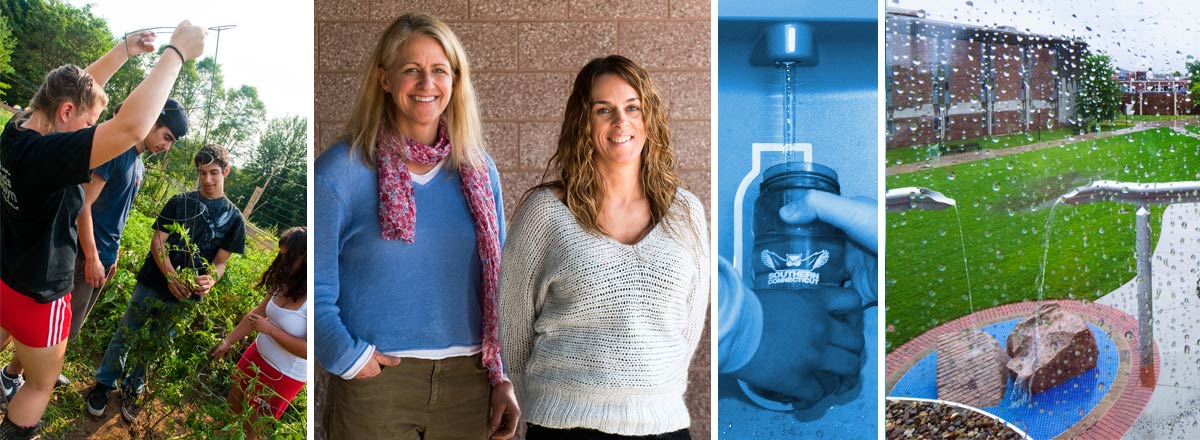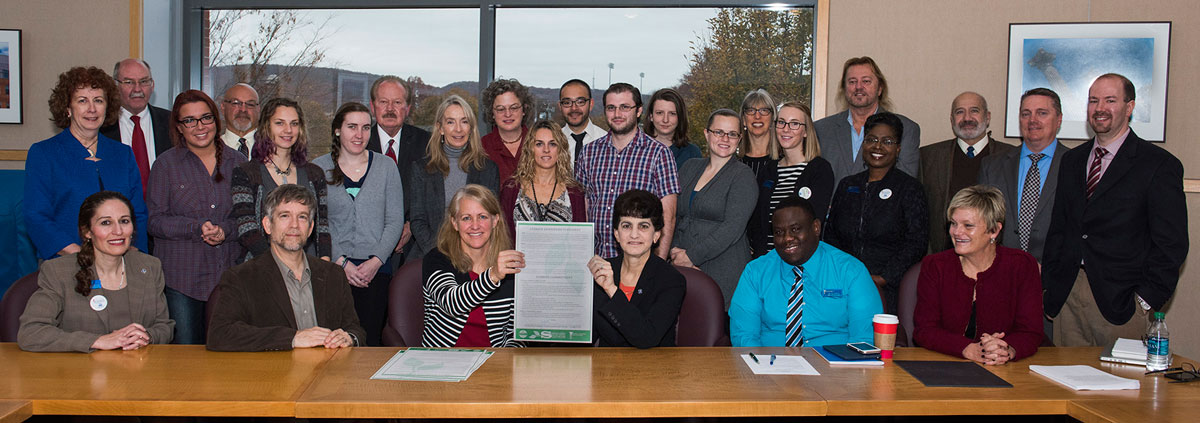In a strong show of leadership in the sustainability arena, Southern’s President Mary A. Papazian has signed a new Climate Leadership Commitment that goes farther than the American College & University Presidents’ Climate Commitment (ACUPCC), to which the university became a charter signatory in 2007.
Signing the ACUPCC meant pledging to reduce the university’s carbon footprint to zero by 2050, an important step to take in 2007. But over the intervening years, it has become clear that a carbon mitigation pledge alone as a strategic imperative isn’t enough.
In 2014, Second Nature, which oversees the efforts around the ACUPCC, introduced the Alliance for Resilient Campuses (ARC), to begin exploring climate adaptation and resilience as complements to the original Climate Commitment. The ACUPCC has been updated as a Carbon Commitment and, to advance the mission of ARC, a new Resilience Commitment has been formed.
Now, there are three possible Commitments a university president or chancellor can sign: the Climate Leadership Commitment, which integrates a goal of carbon neutrality with climate resilience and provides a systems approach to mitigating and adapting to a changing climate; the Carbon Commitment, which is focused on carbon neutrality; and the Resilience Commitment, which deals with climate resilience and adaptation. Papazian, with approval from the Cabinet, signed the first of the three.
“Under this new integrated Climate Leadership Commitment, we are formally committing to continue what we have been working on for many years,” says Papazian. “This includes incorporating sustainability across all of our operations, as well as further developing sustainability in our academic programs, greening our purchasing practices, the way we care for our buildings and grounds, our co-curricular offerings, and reducing the amount of materials we throw away.”
She added, “We are educating our students to prepare them for environmental issues that will be prevalent when they graduate, and the new commitment means that we are going farther than just striving for carbon neutrality. The Climate Leadership Commitment is more than just a declaration or statement: it is a catalyst for rigorous and robust actions on our campus and in our community.”
Southern is one of only 40 of the original 600-plus signatories from across the country to join the new commitment thus far.
Suzanne Huminski, the university’s sustainability coordinator, explains, “In 2007, the conversation was still about ‘is there climate change?’ and about carbon reduction. But climate change impacts are prevalent in the world around us – like the health of Long Island Sound, for instance, or the growing vulnerability of neighborhoods, transportation corridors, and waste water treatment plants close to shore. Studying coastal resilience and the health of the Sound, which the Werth Center has been doing for many years, can now be recognized in our university climate commitment, rather than solely focusing on reducing carbon emissions.”
Signing the new commitment “means we are building a stronger community around adaptation and resilience,” Huminski adds.

Resilience, in the world of sustainability, has to do with two areas, she explains. The first has to do with planning and implementing strategies to prevent or minimize future harm caused by climate change impacts. But even with excellent planning and communication, unexpected challenges will arise, so resilience is also the institution’s ability to recover from unexpected events and adapt to “the new normals” that a changed climate brings.
“We need to be better equipped for these challenges, and we have a role to play in helping surrounding communities do the same,” she says.
The university has made significant strides in sustainability in recent years. From new campus construction and facilities renovations to green transportation options and programs like the Food Recovery Network, Campus Conservation Nationals, Recyclemania, Plant It Forward, and Compost Happens, to projects like the campus community garden, Urban Oasis, Green Room Certification, and refillable water bottle stations, to presentations by guest speakers, and much more — the university has been working on sustainability on many fronts. The Office of Sustainability tracks progress toward meeting greenhouse gas and waste reduction goals of the ACUPCC.
The university is also committed to and has a long history of integrating sustainability into the educational environment, and offers one of the only Environmental Education Master’s programs in New England. The geography degree offers a concentration in sustainability, and the Werth Center for Coastal and Marine Studies has endowed research positions for undergraduates. New for fall 2016, Southern will offer an undergraduate major in Environmental Systems and Sustainability, and the School of Business has developed courses in sustainability management. For many years Southern’s Public Health Department has focused on food justice and access, and one focus of the sustainability office in the past year has been to expand opportunities for student internships, both on campus and partnering with industry.
Huminski says that Southern is attracting national attention for its efforts toward more sustainable operations. This fall, the university was profiled in Business View Magazine for its sustainable practices. The university has twice been named one of the nation’s greenest colleges and universities by the Princeton Review and recently received top honors for a national energy efficiency award sponsored by the Sustainable Endowments Institute. This award was based on energy savings from the Adanti Student Center recommissioning project, which utilized wireless sensing and online energy analytics to address less-than-optimal energy performance . The project paid for itself in three months, and resulted in a 17 percent reduction in energy use in the building.
Huminski points to the dedication of administration, faculty, and staff for embracing sustainability across campus operations. “Students have always been involved,” she says, “but Facilities Operations and Southern’s executive leadership are also a driving force in adopting sustainability. Effective leadership is critical to success.”
Papazian says, “Signing the Climate Leadership Commitment sends a powerful message that we will do better working on this as a campus community — and as part of regional and global communities. Reducing carbon emissions and adapting to the dynamic and changing world around us is complex and involves everyone on campus. We have already been doing this work – with the help of so many folks here at the university.”


